Welcome to our annual survey of covering options in Kentucky for the forthcoming breeding season. As usual, we’ll start with the rookies and work our way through the preceding intakes, before trying to eke out some value among the more established stallions.
A wholly subjective exercise, clearly–so apologies if your fellow doesn’t make our “value podium.” Every farm is understandably sensitive about the reputation of its stallions, for whom opportunity can be so fleeting and about whom fashions can swell or fade on the flimsiest grounds. We’ll do our best to be fair, and polite. It’s all guesswork at this stage, after all, educated or otherwise. And, in the end, individual breeders will decide for themselves what they feel to be right for their own mares.
The choices they might make in an ideal world, after all, are often very different from what may feel necessary in the real one. Very likely, the priority is making sure you get paid enough for your yearling not just to clear fee and keep, but to retrieve something on what you once gave for the mare herself; and still have a little left over to keep the lights on.
Perhaps it’s only from the luxury of this pulpit that I might try to do something dumb like breed a racehorse. Naïve as it may be, however, I do persist in the belief that there should eventually be nothing more commercial, when you’re trying to make a mare or build a family, than to get some winners on the page. Since this time last year, of course, the market has absorbed some frightening shocks. Arguably this is precisely the time, with the fast bucks slowing down, to take a somewhat longer view on your mare. But the whole concept of “value” can encompass a spectrum of strategies, and I’ll do my best to acknowledge that.
In response to the crisis, the farms have certainly done their bit. With the international market showing welcome signs of resilience, and vaccinations on the horizon, generous fee cuts have given breeders every incentive to keep the faith. This, remember, is a community that needs patience and perspective at the best of times. Your 2021 cover typically won’t have a bottom line until you get to the 2023 yearling sales, and it would be nice to think the economy might have spluttered back into growth by then.
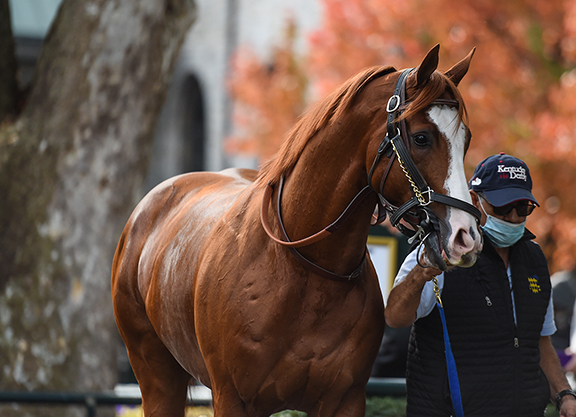
Improbable | Jon Siegel
All that said, to me it looks as though the scythe has been restored to its hook for the sires we feature today. Measured against a market so full of temptingly reduced fees, the newcomers as a class look brutally expensive. But you can’t blame the farm accountants, the commercial market’s infatuation with unproven sires having in recent years become ever more compressed–to the point that selling nominations has often become uphill work even for stallions entering only their second year.
I have banged this drum too often to weary you by reprising the argument here. Suffice to say that the majority of those we examine today start at a fee that will simply keep dwindling, to the point that many will pack their bags for an overseas or regional program; and even the few that do eventually achieve viable careers in Kentucky will typically have to ride out a dip first.
Nonetheless there will be value lurking among them. Most obviously because it’s a question of demand, rather than supply: their fees may never again be so high, nor will their stock ever enjoy the same premium at the sales ring. Each crop, moreover, will have its Not This Time.
The son of Giant’s Causeway was “gold” on our podium when introduced at $15,000 (and remained so when clipped to $12,500 last year). Anyone charitable enough to ascribe that oil-strike to judgement, rather than luck, hopefully won’t be expecting something similar every time. And we’ll have to decide, when revisiting his intake, whether Not This Time can retain a step on that podium at $40,000!
Nowadays, moreover, new stallions can offer extra value when so many farms incentivize even a little perseverance by, for instance, offering lifetime rights for repeat breeders.
One of the most significant recent developments in the stallion market is the way that the pioneer of such schemes, B. Wayne Hughes, is upgrading the caliber of animal to which they apply. Into Mischief himself having started out as a blue-collar experiment, Hughes is now welcoming a succession of authentic Classic types to Spendthrift with the potential to revive the heyday of Nashua, Raise a Native and Seattle Slew.

McKinzie | Benoit
Last year the first, second and joint-third highest fees among the new stallions were all charged at Spendthrift. This time round, rival farms have looked to their laurels but Hughes again stands top of the heap with much the most expensive of the intake, at $75,000–a son, of course, of his remarkable champion sire.
Spendthrift had been quick to double down on Into Mischief, hosting his first-crop star Goldencents as a cheaper alternative to a sire whose fee would soon climb beyond the reach of most. And the success of AUTHENTIC (Into Mischief–Flawless, by Mr. Greeley) in the postponed GI Kentucky Derby has broken priceless new ground for the farm flagship. For here is immediate evidence that the amelioration of Into Mischief’s books as his fee went up–still $45,000 when Authentic was conceived–would enable him to stretch his trademark speed and become a legitimate Classic sire.
Authentic is the only black-type winner under his first two dams but that doesn’t tell a fraction of the story. His unraced granddam (whose half-sister produced the dam of two Grade I winners) died after delivering just three foals, one of which was a 13-length winner on debut, only to bow a tendon on her next start. That was Flawless, and Authentic is only her third starter. The next two dams were both graded stakes winners, but what I really like about Authentic’s page is a ghostly pattern of Ruffian: her half-brother Icecapade recurs top and bottom, while her sire Reviewer gave us the dam of Mr. Greeley.
Yes, they were handing out track records like bobble hats at the Breeders’ Cup; and maybe maturing sophomores would clock 2:00.61 in the Derby more often if they ran it in September every year. But there’s no gainsaying Authentic’s effortless speed. His class-high speed figures were founded on a wonderfully fleet action, which made him look something special even when still a gawky beginner in the GIII Sham S. His gate-to-wire dash guarantees Authentic commercial traction and, as a leggier and stretchier model, the right mares will entitle him to continue dad’s work round that second turn.
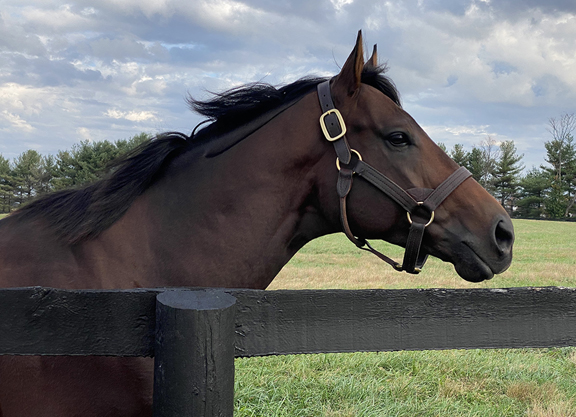
Game Winner | Alys Emson
Would I trade two foals by Omaha Beach for one by his new barnmate? Nope. But that’s just a personal take on the most expensive stallion of the last intake, whose revised price we will visit in the next instalment of this series. We know that Authentic will make his fee function, at least through his first cycle, because he’s the most accomplished son of a freakish stallion now standing at $225,000. And nobody, such is the nature of the business today, will be looking past that initial phase for now.
Just as was the case in the GI Breeders’ Cup Classic, Authentic’s closest pursuer in terms of fees is IMPROBABLE (City Zip–Rare Event, by A.P. Indy) at $40,000. He matured into a most accomplished older horse, with a Grade I hat trick, but WinStar will doubtless be emphasizing what a very smart juvenile he was, too: spectacular on the Breeders’ Cup undercard, he then beat Mucho Gusto (Mucho Macho Man) by five in the GI Los Alamitos Futurity. Though a creditable fifth past the post in the Derby, he looked closer to the finished article in his third campaign.
Certainly it would be gratifying to see another son assist Collected in carrying the torch for City Zip, a set-your-clock force for good in his stock. And Improbable’s granddam is a half-sister to none other than Hard Spun, just one decoration to a bottom line extending to the Darby Dan foundation mare Banquet Bell (Polynesian), i.e. the family of Little Current (Sea-Bird {Fr}) and company.
Improbable has always been a slick mover, and that completes a pretty comprehensive package: pedigree, class, toughness, balance. No less than we should expect, at this kind of money–but he is at a farm, like Authentic, that will secure him numbers and then it will be over to him.
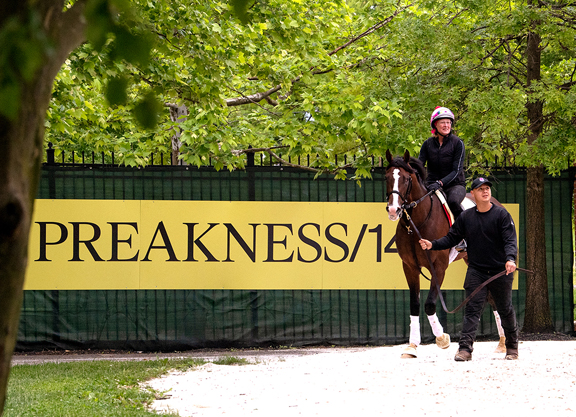
War of Will | Maryland Jockey Club
Next off the grid, at $30,000, extends Bob Baffert’s influence on this intake into a third crop. MCKINZIE (Street Sense–Runway Model, by Petionville) goes to Gainesway with a similar profile to Improbable, as a GI Los Alamitos Futurity winner (albeit in the stewards’ room) who really confirmed his standing at four, similarly winning the GI Whitney S. and placing in the GI Breeders’ Cup Classic. Persevering this year did not really pay off as it deserved, but at least he reiterated his versatility by adding a Grade II success at seven furlongs to his earlier GI Malibu S. score at that trip.
Bottom line is that he’s a Grade I winner at two, three and four, with 11 triple-digit Beyers to his name. That’s the kind of mettle the breed could do with, nowadays, and perhaps traces to a family seeded with some pretty left-field influences: he combines two Mr. Prospector sire lines but his first three dams are by Petionville, Houston and Navajo. This kind of stuff can be pretty invigorating, as one glance at American Pharoah’s family tree will confirm. So while McKinzie is the only Grade I winner out of a Petionville mare, it has all stacked up somehow: his dam, a very smart runner in her own right, has three half-sisters who have also produced a graded stakes winner.
So we’re plainly looking at some kind of genetic vigour, as well as vigour on the track, and don’t let his admirable durability deceive you that McKinzie’s stock will need time. His dam made 10 juvenile starts, sandwiching her third in the GI Breeders’ Cup Juvenile Fillies with two Grade II wins; and the next dam won four times at two, including a couple of Listed prizes.
Starting on the same peg at Lane’s End is GAME WINNER (Candy Ride {Arg}–Indyan Giving, by A.P. Indy), who completes Baffert’s lock on the top four. You have to feel sympathy for connections, who felt there was more to come after he derailed halfway through his sophomore campaign but never got him back on track. But if breeders have to dust off his juvenile championship, they will find it a worthwhile exercise–reminding them how he reeled off three Grade Is after winning on debut, culminating in a decisive defeat of Knicks Go (Paynter) in the GI Breeders’ Cup Juvenile.
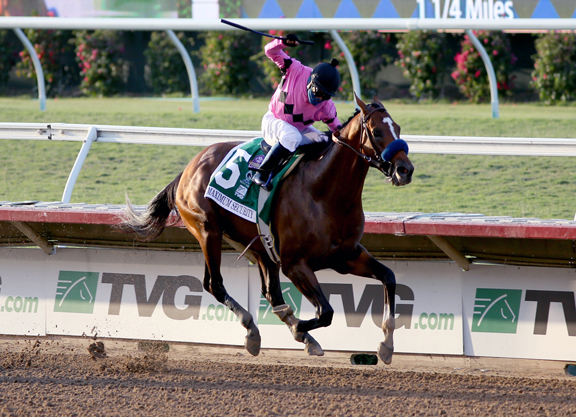
Maximum Security | Horsephotos
He trained on well, too, running the race-fit Omaha Beach (War Front) to a nose on his resumption, while sixth home in the Kentucky Derby was a respectable effort after a messy trip.
A pedigree that superficially hurries through the generations soon repays closer attention. His first three dams have produced just 10 foals between them, through sundry misfortunes, and Game Winner’s only sibling to have started is Grade II winner Flagstaff (Speightstown); while his granddam is champion Fleet Indian (Indian Charlie), who counted two Grade Is among 13 wins from 19 starts. And you can’t complain about the compression of a pedigree that ends up taking you through the Striking branch of La Troienne’s line.
Genes certainly support a fee of $25,000 for WAR OF WILL (War Front–Visions Of Clarity {Ire}, by Sadler’s Wells) at Claiborne.
For a start, he foreshortens access to the two premier branches of the Northern Dancer dynasty in a fashion that is rare today: he’s a grandson of Danzig out of a Sadler’s Wells mare. And what a family that mare represents. His fifth dam is the matriarch Best In Show; closer up, he’s a half-brother to a Group 1-winning juvenile; and their stakes-winning dam is a half-sister to the brilliant miler Spinning World (Nureyev) out of a Group 1-placed half-sister to Chimes of Freedom (Private Account), herself an elite operator and dam of two others in Aldebaran (Mr. Prospector) and Good Journey (Nureyev).
War of Will parlayed this glittering international page into Classic success on dirt plus a Grade I success when switched back to grass for his third season. With his sire rising 19, the chance is there for War of Will to establish himself as a transatlantic influence, obviously at a more accessible fee. He certainly looks the part.
It was War of Will, notoriously, who took the nudge that cost MAXIMUM SECURITY (New Year’s Day–Lil Indy, by Anasheed) the Kentucky Derby. Little could we realise how even the furore over his disqualification would be surpassed by the far graver infringements subsequently alleged about his trainer. One way or another, he could never quite confine headlines to what was plainly a pretty freakish talent: by renouncing the GI Preakness for a 1-20 defeat, for instance, and then when diverted from the Breeders’ Cup by colic. Nor did he build conclusively on what was, in the circumstances, an important Grade I for his new trainer this year. But the bottom line is 10 wins in 14 starts for a rating of 122, and the hapless victim of so much controversy now gets the chance to create a fresh legacy of his own, starting out at Ashford off $20,000.

Vekoma | Sarah Andrew
Maximum Security is another whose first couple of dams introduce pretty exotic names, in Anasheed and Cresta Rider. But a third dam by Double Jay–who was foaled in 1944!–is a throwback I love: he was a fantastic broodmare sire. Anyhow we’ve already remarked how variegation of this kind is no bar to success, and his dam is a three-parts sister to a very hardy multiple Grade I winner in Flat Out (Flatter). Relative to Maximum Security’s accomplishments, the fee takes full account of the fact that he has been a bundle of surprises throughout, for better or worse; and he will reliably be given every chance to write a redemptive final chapter. Put it this way, he has more obvious credentials to make his fee work than when carrying a lesser claiming tag on his debut!
Also launched at $20,000 is VEKOMA (Candy Ride {Arg}–Mona de Momma, by Speightstown) at Spendthrift. He, too, always carried an air of unconventionality–in his case, that highly idiosyncratic action. But there was no arguing with its efficiency, and it is a real shame that he was consecutively derailed just as he was confirming his class both at three and four. At least he went out on a high, in the stallion-making GI Met Mile.
An unbeaten GIII Nashua S. winner at two, he won the GII Blue Grass S. decisively only to disappear for 11 months after his Derby disappointment. On his return he looked much closer to the finished article: after a stylish comeback, he was plainly at home in the slop when romping in the GI Carter H., but no such qualifications were required when he sealed his status as one of the most lavishly talented animals around in what turned out to be his swan song, just a click off the track record.
Though confined to eight starts across three seasons, Vekoma fully established his class and versatility, with Grade I wins at seven, eight and nine furlongs. There’s no mystery as to where it comes from, either. He owed his efficacy in the slop to a dam who won her Grade I in similar conditions, but a more important inheritance was her sisterhood to Mr. Greeley (Gone West) and to the second dams of Street Sense (Street Cry {Ire}) and Paradise Woods (Union Rags). Moreover Vekoma’s fourth dam is Lianga (Dancer’s Image), whose elite scores in Europe were similarly both in sprints and at a mile. She is also the third dam of Coolmore’s rags-to-riches sire Danehill Dancer (Ire).
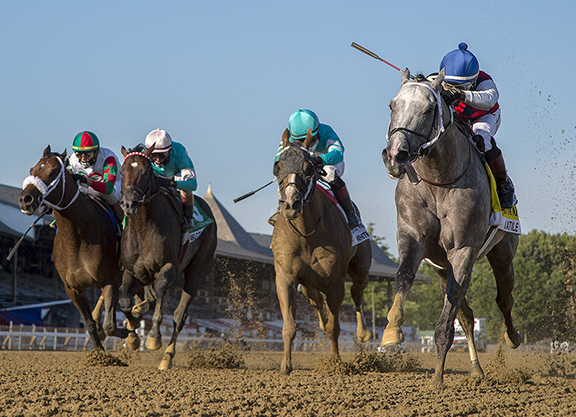
Volatile | Sarah Andrew
Sadly Vekoma’s dam, lost the year she delivered him, won’t be decorating the page further; but the credentials of Candy Ride as a sire of sires grow all the time. This must be his fastest son to stud, moreover, with the precocity to clock a 97 Beyer in the Nashua. Assuming he doesn’t reproduce that quirky gait, Vekoma can make the grade.
Another offering ‘V’ for velocity is VOLATILE (Violence–Melody Lady, by Unbridled’s Song), launched by Three Chimneys at $17,500. It would have been mouthwatering to see the pair of them square up in top form for a race like the GI Forego. Unfortunately Volatile was likewise unable to see things through, confined to three starts as a sophomore and another three this year. But these latter confirmed his blossoming as an authentic speedball: dazzling on his return, he then detonated a 1:07.57 romp in the Aristides S., missing the track record by a sliver; and put a formal Grade I seal on his resumé at Saratoga.
Admittedly he was allowed to tee up his wild closing fractions that day, having controlled the early pace against just three rivals. But an $850,000 yearling tag tells you all you need to know about his looks, as the most expensive son of his flourishing sire; and his second dam is Lady Tak (Mutakddim), a dual Grade I winner over seven at Saratoga–and whose own granddam Dangerous Star (Dark Star) was one the 10 foals of the remarkable Dangerous Dame. Of these, eight mustered a grand total of three starts between them; the other two, however, were the elite winners and producers Hidden Talent and Heavenly Body, both also by Dark Star. This is a family fertile in classy horses on both sides of the Atlantic.
Though himself held up by a setback at two, Volatile’s full-sister as a juvenile became their sire’s first stakes winner as early as May. So breeders can hope to match commercial speed with corresponding precocity. If that happens, Volatile looks highly eligible to achieve the momentum so critical to a young sire in the freshmen’s table.
With so many new sires in the Kentucky marketplace for 2021, stay tuned as we continue to cover more than a dozen others in tomorrow’s instalment.

The post Value Sires for 2021, Part I: New KY Sires appeared first on TDN | Thoroughbred Daily News | Horse Racing News, Results and Video | Thoroughbred Breeding and Auctions.
Source of original post







